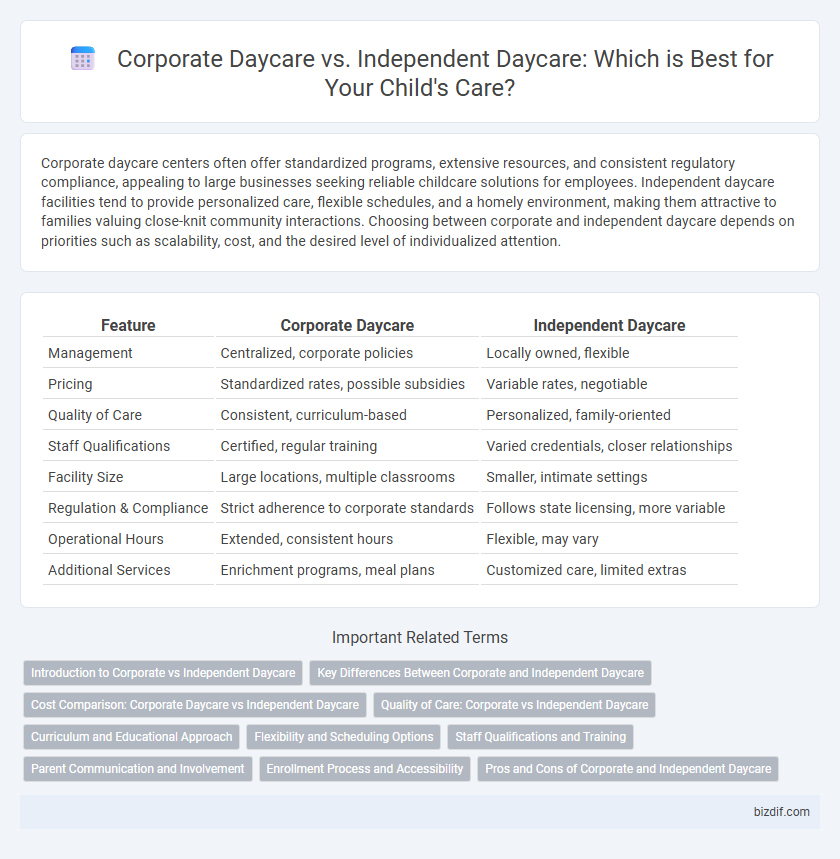Corporate daycare centers often offer standardized programs, extensive resources, and consistent regulatory compliance, appealing to large businesses seeking reliable childcare solutions for employees. Independent daycare facilities tend to provide personalized care, flexible schedules, and a homely environment, making them attractive to families valuing close-knit community interactions. Choosing between corporate and independent daycare depends on priorities such as scalability, cost, and the desired level of individualized attention.
Table of Comparison
| Feature | Corporate Daycare | Independent Daycare |
|---|---|---|
| Management | Centralized, corporate policies | Locally owned, flexible |
| Pricing | Standardized rates, possible subsidies | Variable rates, negotiable |
| Quality of Care | Consistent, curriculum-based | Personalized, family-oriented |
| Staff Qualifications | Certified, regular training | Varied credentials, closer relationships |
| Facility Size | Large locations, multiple classrooms | Smaller, intimate settings |
| Regulation & Compliance | Strict adherence to corporate standards | Follows state licensing, more variable |
| Operational Hours | Extended, consistent hours | Flexible, may vary |
| Additional Services | Enrichment programs, meal plans | Customized care, limited extras |
Introduction to Corporate vs Independent Daycare
Corporate daycare centers typically operate under large organizations with standardized policies, extensive resources, and brand recognition, offering consistent services across multiple locations. Independent daycares are often smaller, locally owned facilities that provide personalized care with flexible approaches tailored to individual community needs. Both models play crucial roles in early childhood development, with corporate centers emphasizing scalability and uniform quality and independent centers focusing on close-knit, community-oriented environments.
Key Differences Between Corporate and Independent Daycare
Corporate daycare centers often operate under standardized policies with extensive resources, providing consistent programming and professional staff training across multiple locations. Independent daycares typically offer a more personalized approach, fostering close relationships with families and greater flexibility in curriculum and scheduling. Key differences include ownership structure, scalability, cost, and the level of regulatory oversight each type experiences.
Cost Comparison: Corporate Daycare vs Independent Daycare
Corporate daycare centers typically offer standardized pricing with possible subsidies or employer discounts, often making them more cost-effective for employees. Independent daycare facilities may have variable rates influenced by location, amenities, and individualized care, sometimes resulting in higher out-of-pocket expenses. Evaluating the total cost requires considering factors such as enrollment fees, daily rates, and available financial assistance in both corporate and independent settings.
Quality of Care: Corporate vs Independent Daycare
Corporate daycare centers often adhere to standardized protocols and benefit from consistent training programs, resulting in reliable quality of care across locations. Independent daycares may offer more personalized attention and flexibility, fostering closer relationships between caregivers and children. Quality of care comparison often depends on staff qualifications, child-to-caregiver ratios, and the specific environment rather than ownership type alone.
Curriculum and Educational Approach
Corporate daycare centers often implement standardized curricula designed to align with national early childhood education standards, ensuring consistency across multiple locations. Independent daycares typically offer more flexible and personalized educational approaches, allowing educators to tailor activities to the specific needs and developmental stages of each child. The choice between corporate and independent daycare can significantly impact the diversity and adaptability of the curriculum provided to young learners.
Flexibility and Scheduling Options
Corporate daycare centers typically offer standardized scheduling options with fixed hours designed to accommodate common workday schedules, ensuring consistency and predictability for parents. Independent daycares, however, often provide more flexible scheduling, including extended hours, part-time care, and customizable attendance plans tailored to individual family needs. Families seeking adaptability in drop-off and pick-up times may find independent daycares more suitable for their dynamic schedules.
Staff Qualifications and Training
Corporate daycare centers often implement standardized staff qualifications and comprehensive training programs aligned with industry regulations, ensuring consistency and adherence to best practices. Independent daycares may vary significantly in staff credentials and training intensity, frequently depending on the owner's management approach and local licensing requirements. Research indicates that corporate settings typically invest more in continuous professional development, enhancing caregiver skills and child safety outcomes.
Parent Communication and Involvement
Corporate daycare centers often implement structured communication systems such as digital portals and regular newsletters, enhancing parent engagement through consistent updates and streamlined feedback channels. Independent daycares provide more personalized parent involvement opportunities, fostering closer relationships via daily interactions and tailored communication methods. Both models prioritize transparency and collaboration but differ in scale and customization of parent communication practices.
Enrollment Process and Accessibility
Corporate daycare centers often feature streamlined enrollment processes supported by digital platforms enabling quick registration and easy document submission, enhancing accessibility for busy parents. Independent daycares may require in-person visits and manual paperwork, which can slow enrollment but allows personalized attention during the intake process. Accessibility in corporate daycare is typically broader due to multiple locations and standardized policies, while independent centers focus on localized community integration and flexible scheduling.
Pros and Cons of Corporate and Independent Daycare
Corporate daycare centers often provide standardized curricula, larger facilities, and extensive resources, but they may lack the personalized care and flexibility found in independent daycare settings. Independent daycares can offer tailored, family-like environments with stronger community ties, though they might face limitations in funding, staff training, and facility upgrades. Evaluating factors such as staff-to-child ratios, accreditation, operational hours, and cost differences is crucial when choosing between corporate and independent daycare options.
Corporate Daycare vs Independent Daycare Infographic

 bizdif.com
bizdif.com